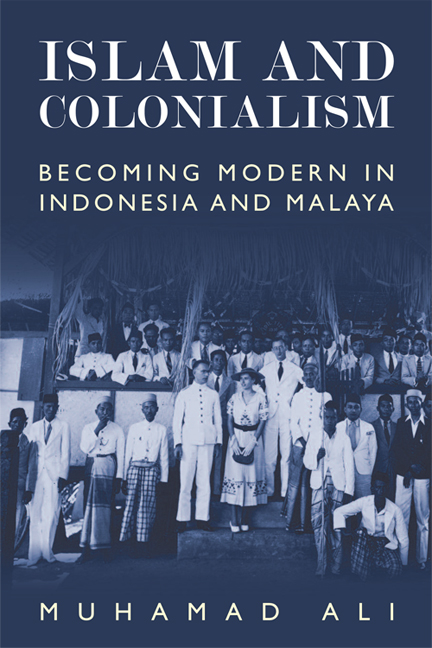Book contents
- Frontmatter
- Contents
- Glossary
- Acknowledgements
- List of Abbreviations
- Transcriptions and Orthography
- Map
- Introduction
- Part I Making Islam Modern
- Part II Modernising Politics and Government
- Part III Modernising Law
- Part IV Modernising Education
- VII Teaching Agama and the Secular
- VIII Secularising Education
- Conclusion
- Bibliography
- Index
VIII - Secularising Education
from Part IV - Modernising Education
Published online by Cambridge University Press: 05 September 2016
- Frontmatter
- Contents
- Glossary
- Acknowledgements
- List of Abbreviations
- Transcriptions and Orthography
- Map
- Introduction
- Part I Making Islam Modern
- Part II Modernising Politics and Government
- Part III Modernising Law
- Part IV Modernising Education
- VII Teaching Agama and the Secular
- VIII Secularising Education
- Conclusion
- Bibliography
- Index
Summary
The great colonial schools… taught generations of the native bourgeoisie important truths about history, science, culture. Out of that learning process millions grasped the fundamentals of modern life, yet remained subordinate dependents of an authority elsewhere than in their lives.
(Said 1994: 223)Teaching agama shall be prohibited in governmental schools, but it is allowed outside regular hours, according to the decision made by the Department of Education and Religion.
(Departement van Orderwijs en Eeredienst 1919: 5)The educational system has produced Malays who have taken honours at Cambridge and have been called to the bar and qualified as doctors and engineers. Continued social progress will depend on the extension of all types of education suited to local needs.
(Winstedt 1947: 177)Edward Said has argued that one of the purposes of colonial education was to promote the history of Europeans and thus to ‘demote the native history’ (Said 1994: 223). In this chapter, while Said's observation is generally correct, I will discuss the various ways in which Dutch and British colonial education functioned in the colonies. Europeans expressed a variety of educational goals, stating that an education assisted people in ‘pursuing happiness’ or ‘fulfilling the powers of the individual mind’, but that it should also ‘fit the needs of the community’ and help ‘create a better society’. Some colonialists hoped a good education would ‘bring East and West together’ and ‘soften the violence of the impact’ of Western norms on native life (Furnivall 1943: 4; Steenbrink 2006: 88). Europeans believed that in areas where ‘Eastern and Western cultures meet’, ‘Western culture’ should be emphasised, but as will be discussed in the following, they did not neglect ‘Eastern’ languages and cultures. Said is right about the general tendency, but some qualifications are necessary depending on the colonial administrators and local contexts. Nativeness and Islam were not always identical. Local languages such as Javanese, Buginese and Malay were generally favoured over Arabic by the European educators due to the latter's ‘foreignness’ to the local population. The Europeans generally saw the teaching of Islamic disciplines as medieval with memorisation and indoctrination in contrast to what they saw as modern science and education.
The Dutch taught Dutch language to the native elite and the willing ordinary people but they studied and taught some local languages (Javanese, Buginese and so forth) in the vernacular schools.
- Type
- Chapter
- Information
- Islam and ColonialismBecoming Modern in Indonesia and Malaya, pp. 256 - 278Publisher: Edinburgh University PressPrint publication year: 2015



